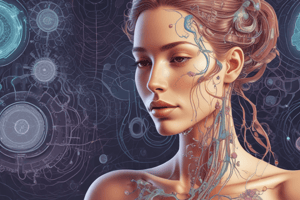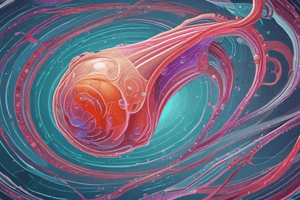Podcast
Questions and Answers
What percentage of sperm is typically found in a single ejaculation of semen?
What percentage of sperm is typically found in a single ejaculation of semen?
- 25 to 30%
- 5 to 10% (correct)
- 50 to 60%
- 15 to 20%
Which component of sperm is responsible for providing energy to propel its tail?
Which component of sperm is responsible for providing energy to propel its tail?
- Tail
- Head
- Acrosome
- Midpiece (correct)
How long does it typically take for sperm to mature in the seminiferous tubules?
How long does it typically take for sperm to mature in the seminiferous tubules?
- Two months (correct)
- One month
- Three months
- One week
What enzyme is contained in the acrosome of a sperm cell?
What enzyme is contained in the acrosome of a sperm cell?
During a single human ejaculation, how many sperm are typically present?
During a single human ejaculation, how many sperm are typically present?
What is the primary function of fructose within semen?
What is the primary function of fructose within semen?
Which phase of sperm development follows the primary spermatocyte stage?
Which phase of sperm development follows the primary spermatocyte stage?
What is the total number of sperm a man produces approximately over his lifetime?
What is the total number of sperm a man produces approximately over his lifetime?
During which phase of the menstrual cycle does the uterus lining break down?
During which phase of the menstrual cycle does the uterus lining break down?
Which hormonal changes are primarily responsible for the repair of the uterus lining?
Which hormonal changes are primarily responsible for the repair of the uterus lining?
What event is marked on day 14 of the menstrual cycle?
What event is marked on day 14 of the menstrual cycle?
Which of the following hormones is NOT involved in the menstrual cycle?
Which of the following hormones is NOT involved in the menstrual cycle?
What is the primary role of the Sertoli cells in the epididymis?
What is the primary role of the Sertoli cells in the epididymis?
Which of the following denotes the period during which blood and cells are lost from the uterus?
Which of the following denotes the period during which blood and cells are lost from the uterus?
Under which conditions do mature sperm show optimal motility?
Under which conditions do mature sperm show optimal motility?
What is the effect of sperm count below 20 million/ml?
What is the effect of sperm count below 20 million/ml?
Which substance secreted by the seminal vesicles plays a crucial role in providing energy for sperm?
Which substance secreted by the seminal vesicles plays a crucial role in providing energy for sperm?
What is the primary hormonal effect of luteinizing hormone (LH) in the male reproductive system?
What is the primary hormonal effect of luteinizing hormone (LH) in the male reproductive system?
What is the maximum duration that sperm can maintain their fertility in the epididymis?
What is the maximum duration that sperm can maintain their fertility in the epididymis?
How does the prostate gland contribute to the fertilization process?
How does the prostate gland contribute to the fertilization process?
Which factors can render sperm with a normal count infertile?
Which factors can render sperm with a normal count infertile?
What must occur for normal sexual function in males?
What must occur for normal sexual function in males?
During which phase of the sexual response cycle does heightened sexual awareness occur?
During which phase of the sexual response cycle does heightened sexual awareness occur?
What primarily mediates the emission phase of ejaculation?
What primarily mediates the emission phase of ejaculation?
What leads to the flaccid state during detumescence?
What leads to the flaccid state during detumescence?
What role does the pudendal nerve play during ejaculation?
What role does the pudendal nerve play during ejaculation?
What is the primary vessel involved in the vascular phenomenon of erection?
What is the primary vessel involved in the vascular phenomenon of erection?
Which structure mediates the tactile stimulation that contributes to sexual arousal?
Which structure mediates the tactile stimulation that contributes to sexual arousal?
Which neurotransmitter is crucial for the induction of vascular smooth muscle relaxation during erection?
Which neurotransmitter is crucial for the induction of vascular smooth muscle relaxation during erection?
What is the result of increased blood flow during erection?
What is the result of increased blood flow during erection?
Where do sperm undergo maturation after formation in the seminiferous tubules?
Where do sperm undergo maturation after formation in the seminiferous tubules?
What role does follicle stimulating hormone (FSH) play in the male reproductive system?
What role does follicle stimulating hormone (FSH) play in the male reproductive system?
How is estrogen formed in the male reproductive system?
How is estrogen formed in the male reproductive system?
Which process initiates emission during the male sexual act?
Which process initiates emission during the male sexual act?
What is the primary function of testosterone in the male body?
What is the primary function of testosterone in the male body?
What occurs in the absence of growth hormone (GH) during spermatogenesis?
What occurs in the absence of growth hormone (GH) during spermatogenesis?
Which hormone is pivotal during fetal life for initiating testosterone production?
Which hormone is pivotal during fetal life for initiating testosterone production?
Which statement about the secretion of androgens in males is correct?
Which statement about the secretion of androgens in males is correct?
At what stage of life does testosterone production cease until puberty?
At what stage of life does testosterone production cease until puberty?
What primary role does testosterone play during fetal development?
What primary role does testosterone play during fetal development?
During which period do the testes typically descend into the scrotum due to testosterone secretion?
During which period do the testes typically descend into the scrotum due to testosterone secretion?
Which of the following is NOT a secondary sexual characteristic influenced by testosterone?
Which of the following is NOT a secondary sexual characteristic influenced by testosterone?
Which effect of testosterone on hair growth is described in the content?
Which effect of testosterone on hair growth is described in the content?
What influence does testosterone have on the structure of the pelvis?
What influence does testosterone have on the structure of the pelvis?
Which of the following statements is true regarding testosterone's effect on muscle development?
Which of the following statements is true regarding testosterone's effect on muscle development?
Which of the following aspects does testosterone influence concerning bone density?
Which of the following aspects does testosterone influence concerning bone density?
How does testosterone affect skin characteristics during development?
How does testosterone affect skin characteristics during development?
Flashcards
Spermatogenesis
Spermatogenesis
The process of sperm development in the testes. Begins with spermatogonia, progresses through stages like primary spermatocytes, secondary spermatocytes, and spermatids, culminating in mature sperm.
Semen
Semen
The fluid ejaculated by a male, composed primarily of sperm and seminal fluid. It contains fructose, fatty acids, and proteins to nourish sperm.
Spermatogonia
Spermatogonia
Specialized cells within the testes that undergo spermatogenesis to become mature sperm.
Acrosome
Acrosome
Signup and view all the flashcards
Midpiece
Midpiece
Signup and view all the flashcards
Tail
Tail
Signup and view all the flashcards
Nucleus
Nucleus
Signup and view all the flashcards
Ejaculation
Ejaculation
Signup and view all the flashcards
Sperm Motility
Sperm Motility
Signup and view all the flashcards
Sperm Storage
Sperm Storage
Signup and view all the flashcards
Epididymis Secretion
Epididymis Secretion
Signup and view all the flashcards
Sperm Activity
Sperm Activity
Signup and view all the flashcards
Seminal Vesicle Function
Seminal Vesicle Function
Signup and view all the flashcards
Prostate Gland Function
Prostate Gland Function
Signup and view all the flashcards
Sperm Count and Infertility
Sperm Count and Infertility
Signup and view all the flashcards
Sperm Morphology & Motility
Sperm Morphology & Motility
Signup and view all the flashcards
What does FSH do in spermatogenesis?
What does FSH do in spermatogenesis?
Signup and view all the flashcards
What is the role of estrogen in spermatogenesis?
What is the role of estrogen in spermatogenesis?
Signup and view all the flashcards
How does growth hormone influence spermatogenesis?
How does growth hormone influence spermatogenesis?
Signup and view all the flashcards
What happens during penile erection?
What happens during penile erection?
Signup and view all the flashcards
What is the role of lubrication in the male sexual act?
What is the role of lubrication in the male sexual act?
Signup and view all the flashcards
What happens during emission and ejaculation?
What happens during emission and ejaculation?
Signup and view all the flashcards
Where is testosterone produced and what other androgens are secreted?
Where is testosterone produced and what other androgens are secreted?
Signup and view all the flashcards
How is testosterone converted into dihydrotestosterone, and what's the significance of this conversion?
How is testosterone converted into dihydrotestosterone, and what's the significance of this conversion?
Signup and view all the flashcards
What is menstruation?
What is menstruation?
Signup and view all the flashcards
What is the proliferation phase?
What is the proliferation phase?
Signup and view all the flashcards
What is ovulation?
What is ovulation?
Signup and view all the flashcards
Which hormones regulate the menstrual cycle?
Which hormones regulate the menstrual cycle?
Signup and view all the flashcards
What is the menstrual cycle?
What is the menstrual cycle?
Signup and view all the flashcards
What are the essential components of normal male sexual function?
What are the essential components of normal male sexual function?
Signup and view all the flashcards
Describe the sexual response cycle.
Describe the sexual response cycle.
Signup and view all the flashcards
How is the erection process regulated?
How is the erection process regulated?
Signup and view all the flashcards
What triggers a reflexogenic erection?
What triggers a reflexogenic erection?
Signup and view all the flashcards
Explain the neural mechanisms involved in erection.
Explain the neural mechanisms involved in erection.
Signup and view all the flashcards
How is the erection a vascular phenomenon?
How is the erection a vascular phenomenon?
Signup and view all the flashcards
Describe the two stages of ejaculation.
Describe the two stages of ejaculation.
Signup and view all the flashcards
How does detumescence occur?
How does detumescence occur?
Signup and view all the flashcards
What happens to sperm in the epididymis?
What happens to sperm in the epididymis?
Signup and view all the flashcards
How do the central and peripheral nervous systems interact in male sexual function?
How do the central and peripheral nervous systems interact in male sexual function?
Signup and view all the flashcards
Testosterone's role in fetal development
Testosterone's role in fetal development
Signup and view all the flashcards
Testosterone and testicular descent
Testosterone and testicular descent
Signup and view all the flashcards
Testosterone's effects during puberty
Testosterone's effects during puberty
Signup and view all the flashcards
Testosterone and hair growth
Testosterone and hair growth
Signup and view all the flashcards
Testosterone and voice
Testosterone and voice
Signup and view all the flashcards
Testosterone and acne
Testosterone and acne
Signup and view all the flashcards
Testosterone and muscle growth
Testosterone and muscle growth
Signup and view all the flashcards
Testosterone and bone development
Testosterone and bone development
Signup and view all the flashcards
Study Notes
Reproductive System Overview
- The lecture covers the reproductive systems of males and females.
- Learning objectives include describing semen composition, ejaculation physiology, male sex hormones (testosterone), the female reproductive cycle, female sex hormones (estrogen and progesterone), sperm production, and the physiology of erection and ejaculation.
Sperm Production
- Each testis contains seminiferous tubules (over 800 tightly looped vessels).
- Sperm development starts as blob-like cells (spermatogonia) lining the inner wall of the tubules.
- These cells mature through stages (primary spermatocytes, secondary spermatocytes, spermatids) to become sperm with tails.
- Thousands of sperm are produced every second, taking about two months to mature.
Semen Composition
- Semen is more than just sperm; it consists of approximately 5-10% sperm.
- The remaining 90-95% is composed of fructose, fatty acids, and proteins that nourish the sperm during their journey.
- A healthy man produces roughly 525 billion sperm over his lifetime, with close to 1 billion per month.
- An average ejaculation contains 200-500 million sperm.
Sperm Structure
- Sperm consists of a head, midpiece, and tail.
- The head contains the nucleus (with chromosomes) and the acrosome (containing enzymes for penetrating the female egg).
- The midpiece has mitochondria for energy to power the tail's movement.
- The tail propels the sperm forward.
Physiology of Erection and Ejaculation
- Normal male sexual function needs an intact libido, ability to achieve and maintain erection, ejaculation, and detumescence (return to flaccid state).
- Erection is mediated by both central (psychogenic) and peripheral (reflexogenic) innervation.
- Central innervation involves CNS stimulation or antagonism of spinal pathways for erection and ejaculation.
- Peripheral innervation involves tactile stimulation reflexively triggering parasympathetic (PSNS) vasodilation, stimulating endothelium to release NO to induce vascular smooth muscle relaxation and blood flow. Prostaglandins aid SMC relaxation causing the erection.
- The response is regulated by sympathetic nervous system (SNS) inhibition.
Sexual Response Cycle
- The sexual response cycle consists of excitement, plateau, orgasmic, and resolution phases.
- Excitement phase: erection and heightened sexual awareness.
- Plateau phase: intensification and body responses (increased heart rate, blood pressure, breathing rate, muscle tension).
- Orgasmic phase: ejaculation and other responses that culminate in sexual excitement.
- Resolution phase: return to pre-arousal state.
Ejaculation
- Ejaculation is mediated by sympathetic nervous system (SNS) impulses.
- Emission is mediated by T11-L2 spinal segments via hypogastric and pelvic plexuses, involving contraction of the epididymis, ductus deferens, seminal vesicles and prostate which prevents semen from entering the bladder.
- Expulsion is mediated by somatic motor impulses via the pudendal nerve, characterized by rhythmic contraction of bulbospongiosus and ischiocavernosus muscles, increasing pressure in the penis to expel semen.
- The subsequent detumescence phase is mediated by NA from SNS nerves and endothelin from vascular endothelium, causing SMC contractions induced by postsynaptic adrenergic receptors for increased venous outflow, restoring the flaccid state.
Maturation of Sperm in the Epididymis
- After sperm formation in the seminiferous tubules, several days are needed to pass through the epididymis (still non-motile).
- Motility develops in 18-24 hours in the epididymis.
- Inhibitory proteins in the epididymal fluid prevent final motility until after ejaculation.
Storage of Sperm
- Adult human testes produce up to 120 million sperm daily.
- The majority of sperm are stored in the epididymis, maintaining fertility for at least a month.
- Sperm are kept inactive by inhibitory substances.
- After ejaculation, sperm become motile and capable of fertilization.
Physiology of Mature Sperm
- Mature sperm are motile and capable of fertilization in a neutral to slightly alkaline medium.
- Their activity decreases in a mildly acidic medium.
- Life expectancy in the female genital tract is only 1-2 days.
Function of Seminal Vesicles and Prostate Gland
- Seminal vesicles secrete mucoid material containing fructose, citric acid, nutrients, prostaglandins, and fibrinogen.
- The prostate gland secretes a thin, milky fluid containing calcium, citrate, phosphate ions, a clotting enzyme, and profibrinolysin.
- The alkaline prostatic fluid is crucial for successful fertilization.
Effect of Sperm Count on Fertility
- Normal semen volume during coitus is 3-5 ml.
- Normal sperm counts range from 35-200 million sperm per ml.
- Sperm counts below 20 million per ml lead to infertility.
Hormonal Factors Stimulating Spermatogenesis
- Testosterone (secreted by Leydig cells) is essential for growth and division of germinal cells.
- LH (luteinizing hormone) stimulates Leydig cells to secrete testosterone.
- FSH (follicle-stimulating hormone) stimulates Sertoli cells, stimulating the conversion of spermatids to sperm.
- Estrogen is derived from testosterone by Sertoli cells under FSH stimulation and also essential for spermatogenesis.
- Growth hormone is necessary for controlling metabolic functions of the testis
Male Sexual Act
- Stages of the male sexual act (Erection, Lubrication, Emission and Ejaculation)
Testosterone and Its Functions
- Testosterone is secreted by interstitial Leydig cells within the testes. The testes also secrete other male hormones known as androgens that include dihydrotestosterone and androstenedione.
- Testosterone is more abundant but dihydrotestosterone is more active within target cells. Active testosterone requires conversion into dihydrotestosterone.
- Testosterone plays a key role in fetal development, stimulating male characteristics and suppressing female ones.
- During fetal development and puberty, testosterone stimulates development of primary and secondary sexual characteristics. Specific features involved include:
- Enlargement of penis, scrotum, and testes
- Distribution of body hair (pubic, facial, chest, etc.)
- Baldness
- Voice changes (larynx enlargement)
- Acne
- Increased muscle mass
- Increased bone thickness
- Ca2+ retention and bone growth.
Cryptorchidism
- Cryptorchidism is the failure of the testes to descend into the scrotal sac.
- It should be treated before puberty due to a higher incidence of malignant tumors.
Menstrual Cycle
- The menstrual cycle is the body's preparation for pregnancy, controlled by hormones.
- Hormones involved include follicle-stimulating hormone (FSH), luteinizing hormone (LH), estrogen, and progesterone.
- Key phases include menstruation, proliferation, and ovulation.
Studying That Suits You
Use AI to generate personalized quizzes and flashcards to suit your learning preferences.




